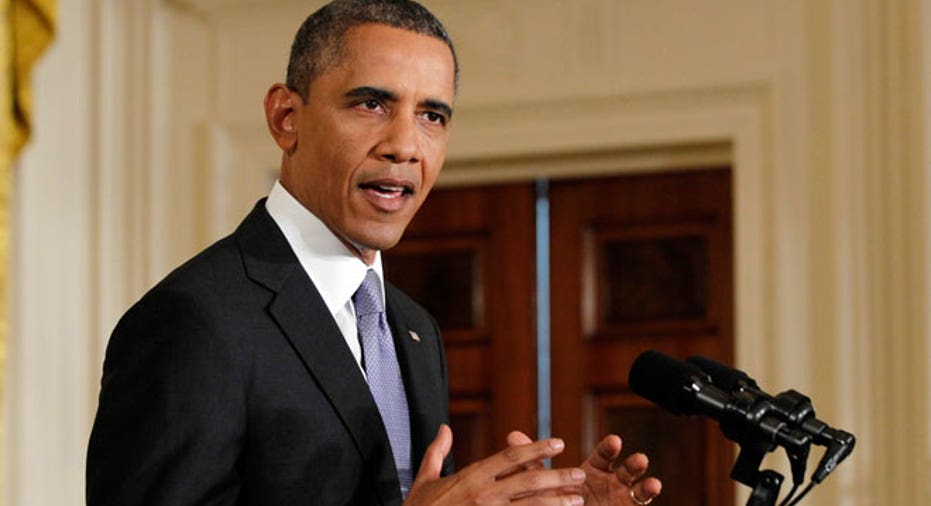Are the President’s Poll Numbers Down Because He’s Not Manning Up?

Is it me or does President Obama throw a lot of people under the bus? Rather than ever taking the hit for the hits that seem to keep coming his way, he points them another way. And more often than not, his own team’s way.
The latest example is the president’s handling of this whole ISIL mess. Was he caught off guard by the terrorist group’s sudden insurgence? The president was quick to tell Steve Kroft of “60 Minutes” he was. But he clearly laid the blame on security officials who apparently let him down, and who should have known better.
While the president accurately quoted James Clapper for acknowledging that national intelligence experts did not foresee the stunning success of the Islamic State against the Iraqi Army, the damning indictment didn’t win him much praise among security personnel.
As Peter Baker and Eric Schmitt write in the New York Times, “by pointing to the agencies without mentioning any misjudgments of his own, Mr. Obama left intelligence officials bristling about being made into scapegoats and critics complaining that he was trying to avoid responsibility.”
White House Press Secretary Josh Earnest quickly tried to clarify that the president wasn’t blaming his intelligence agencies. “That is not what the president’s intent was,” he explained. “What the president was trying to make clear was how difficult it is to predict the will of security forces that are based in another country to fight.”
Maybe so, but it did sound like a bit of Yogi Berra “déjà vu all over again.” To hear Rep. Mike Rogers (R-Mich.) tell the Times, “This was not an intelligence community failure, but a failure by policy makers to confront the threat.”
And it closely echoed the president’s initial comments after the Benghazi attack back in 2008, when he blamed miscommunication on the ground, and insisted the White House did everything in its power to protect its Libyan ambassador and other personnel at that besieged embassy.
Sound familiar? Those targeted by the Internal Revenue Service were told much the same about their ordeal; that while the president insisted there wasn’t a smidgeon of evidence of purposeful wrong-doing on the part of the tax agency overall, there certainly wasn’t any concerted effort on the part of White House personnel to target conservative groups.
The pattern is a consistent one, and to Tea Party critics like Gina Louden, a troubling one. Whether it comes to a Justice Department targeting reporters or a tax behemoth going after political groups, “I just know it just doesn’t smell right,” she told me.
Another conservative now challenging the IRS targeting went even further. “Fish generally stinks from the head,” he said. “This starts with the President. He’s the guy in charge.”
Even allowing for the fact the president’s a busy man and cannot immerse himself in all such details, critics point to a tendency on the part of this President to freely throw the blame on someone else. To quote Democratic pollster Pat Caddell, “you lose friends when you keep treating them like they’re anything but.”
Kathleen Sebelius discovered this first-hand, when she took the brunt of the blame for a disastrous healthcare law rollout and a series of technical glitches that have yet to be ironed out. That doesn’t mean that as head of Health and Human Services at the time, Sebelius shouldn’t bear some responsibility for the law’s rocky debut, but ALL the responsibility?
The president has done much the same when talking up this lackluster recovery. He correctly cites the uniquely catastrophic conditions he inherited (as if other presidents had not), and points to the statistical turnaround that he insists is real. What he fails to grasp and routinely blames others for, is Americans not appreciating his efforts.
The best the president can offer when pressed by Steve Kroft on the subject is that he’s the one trying -- so maybe others should be trying more. That’s his way of acknowledging the problem but in this case, blaming the other side for not doing more to help solve the problem.
That’s why Americans aren’t buying this recovery, the president explained. “They don’t feel it. And the reason they don’t feel it is because incomes and wages are not going up. There are solutions to that. If we raise the minimum wage, if we make sure women are getting paid the same as men for doing the same work, if we are rebuilding our infrastructure.”
What President Obama is saying is that all the stuff he’s doing is working, and he can’t figure out for the life of him, why if he was only given the opportunity to do more of that stuff, stuff would be better; “if we’re doing more to invest in job training so people are able to get the jobs that are out there right now, because manufacturing is coming back to this country. Not just the auto industry that we’ve saved, but you’re starting to see reinvestment here in the United States." Businesses around the world are saying for the first time in a long time, “The place to invest isn’t in China. It’s the United States.”
That’s not to say the president doesn’t make a point, but he seems way too busy pointing figures while he does. And to hear congressional stars like Paul Ryan tell it, his approach poisons the negotiating well.
And Pat Caddell says not only with Republicans, with Democrats as well. “There’s a reason why vulnerable Democratic candidates avoid the president,” he explains. It’s not only his policies, it’s his approach to his policies and damning everyone else for the failure of those policies.
Let’s just say not a smart way to inspire confidence. But worse, not a smart way to lead, because when you’re too busy shifting blame, don’t be surprised when the real “shift” hits the fan, and the president comes to discover, he has no fans, or sadly…friends.



















